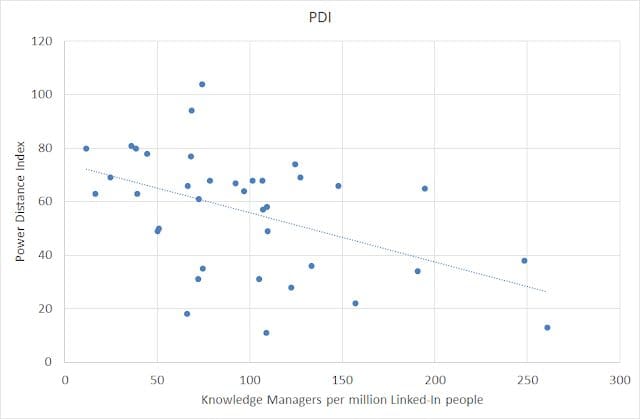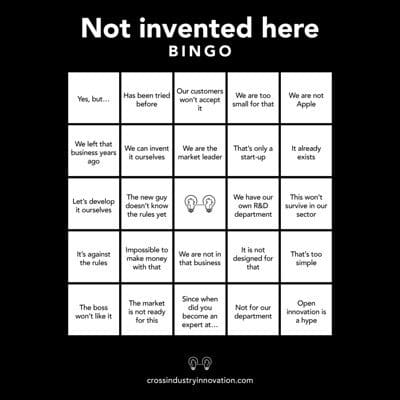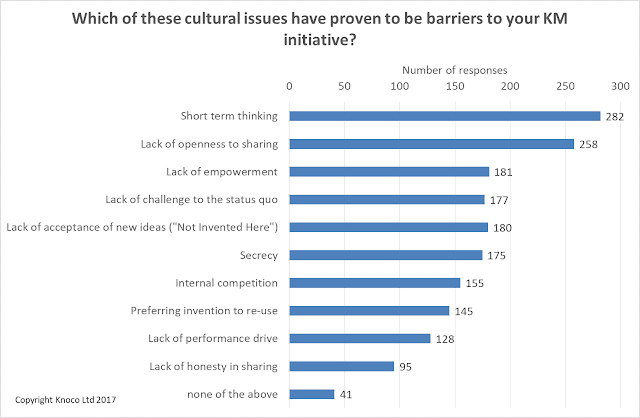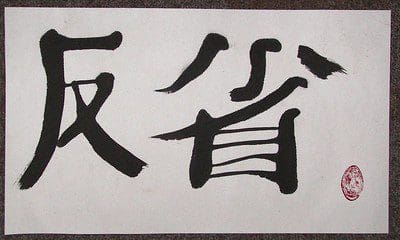
Favorite Incrementalism will not work as a way to introduce Knowledge Management. KM is a mindshift – a giant leap – not a series of small steps. One giant leap by Vivobarefoot on Flickr Incrementalism is a method of working or changing by using many small incremental changes instead of
Read More
 Shared by Nick Milton January 22, 2021
Shared by Nick Milton January 22, 2021

Favorite If leaders are to empower their knowledge workers, they have to let go of “always having the answer” Image from wikimedia commons The book “It’s Your Ship: Management Techniques from the Best Damn Ship in the Navy” tells how Captain Michael Abrashoff took command of the USS Benfold and
Read More
 Shared by Nick Milton November 25, 2020
Shared by Nick Milton November 25, 2020

Favorite A few years ago I compared published cultural dimensions for various countries against a proxy measure of KM maturity. This blog post repeats that analysis with more recent, and more complete, data. One of the most famous (although controversial) studies of national culture was by Geert Hofstede. Hofstede looked
Read More
 Shared by Nick Milton August 10, 2020
Shared by Nick Milton August 10, 2020
Favorite If Knowledge Management is like gardening and the knowledge manager is like a gardener (see here to understand the metaphor), then Internal competition is like a late frost that kills all your green shoots. Frosted by Lauryn on Flickr There is no point in planting the seeds of Knowledge
Read More
 Shared by Nick Milton July 28, 2020
Shared by Nick Milton July 28, 2020

Favorite It’s the ultimate chicken and egg situation. KM requires a supportive culture, yet how do you develop the culture without doing KM? Should you wait for the culture to change, and then start your KM initiative, or should you start your KM initiative knowing you have to battle against
Read More
 Shared by Nick Milton July 7, 2020
Shared by Nick Milton July 7, 2020

Favorite One of the main barriers to knowledge transfer and re-use is complacency. Benchmarking (internal and external) can help remove this complacency. Not invented here Bingo, by Ramon Vullings on Flickr One of the biggest barriers to overcome in Knowledge Management is a lack of desire to learn from others,
Read More
 Shared by Nick Milton March 17, 2020
Shared by Nick Milton March 17, 2020

Favorite Which are the most common cultural barriers to KM? How do these barriers change with KM maturity? Which parts of the world have the most cultural barriers? These are some of the questions we addressed in our recent surveys of Knowledge Management. The results from the 2014 survey are
Read More
 Shared by Nick Milton March 13, 2020
Shared by Nick Milton March 13, 2020

Favorite Effective learning within an organisation requires consistent and rigorous self-analysis, in order to pick up learning points and points of improvement. In Japan, this process is known as Hansei. Hansei, by Jim O’Neil, on Flickr Although alien to many in the west, Hansei is an important part of the
Read More
 Shared by Nick Milton March 4, 2020
Shared by Nick Milton March 4, 2020

Favorite The Farnham Street blog (reporting on the book Mind Gym) describes nine tactics you can use to influence others, while making the point that ““it is essential that you understand the other person’s reasons so you can use tactics that will work to persuade them, as opposed to tactics that
Read More
 Shared by Nick Milton February 27, 2020
Shared by Nick Milton February 27, 2020

Favorite Who owns the knowledge in your head; you, or the company you work for? Image by Frits Ahlefeldt on Wikimedia Commons Instinctively most of us assume that we own the knowledge in our heads. It’s our head, so it’s our knowledge. A 2012 LinkedIn poll tested this question, providing
Read More
 Shared by Nick Milton February 24, 2020
Shared by Nick Milton February 24, 2020
![]() Shared by Nick Milton January 22, 2021
Shared by Nick Milton January 22, 2021








